 Nations: Mania: History
Nations: Mania: History Nations: Mania: History
Nations: Mania: HistoryBorn in England to Spanish parents, holding two passports, named Manuel Neira Rodriguez but sent to an English school and encouraged to speak English as fluently and convincingly as I could, it is perhaps unsurprising that as a child I grew up with a somewhat jaundiced view of the concept of nationality.
My British school friends considered me Spanish, on a number of reasonable, if not unarguable grounds:
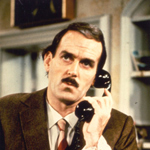 John Cleese. Bastard.1. My name was not merely foreign: it was the name of the internationally famous Spanish waiter in Fawlty Towers, which went on to be voted the Most Popular British Sitcom and then probably Most Familiar Thing In The Known Universe Ever. I wonder even now if John Cleese ever stopped to think, as he struck Andrew Sachs on the head with a spoon in the name of comedy, of the many small boys in Britain, innocently sharing his victim's fictional name, who would suffer similar indignities in the months to come. Bastard.
John Cleese. Bastard.1. My name was not merely foreign: it was the name of the internationally famous Spanish waiter in Fawlty Towers, which went on to be voted the Most Popular British Sitcom and then probably Most Familiar Thing In The Known Universe Ever. I wonder even now if John Cleese ever stopped to think, as he struck Andrew Sachs on the head with a spoon in the name of comedy, of the many small boys in Britain, innocently sharing his victim's fictional name, who would suffer similar indignities in the months to come. Bastard.
To the British, 'Manuel' was not merely a Spanish name: it was the Spanish name. Indeed, it transcended the particular and embodied the very essence of Spanish-nameness. An Englishman called Manuel was about as convincing as a Pope Gwendoline.
I think only a school-friend called Adolph could possibly have truly sympathised. Sadly, I never met one.
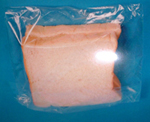 The British School Lunch:
The British School Lunch:
layered bread2. I turned up to school with strange, smelly, foreign muck in my sandwiches.
Actually, that wasn't the real issue. The real issue was that I turned up to school with sandwiches with anything in them at all. My friends, it seemed to me, were eating simply eating bread. I imagined their mothers lovingly spreading margarine over two square slices of dry white bread and then carefully pressing the layers together to make the Standard British School Lunch: layered bread.
Like an outraged rationalist surrounded by religious believers, I would insist that my friends were eating simply bread, but they would patiently explain that their sandwiches contained unknown saxon delights such as 'fish paste', 'primula cheese', or (most mysteriously of all) 'sandwich spread'. To a boy brought up on food, these substances sounded wildly exotic, but ask one of these lads what he was eating, and he'd tell you he didn't know because his 'mum made it'. The idea that food might be identifiable by taste or texture once separated from its labelled container was merely another of my crank foreign theories.
In fact, the sandwich filling my friends considered the most foreign and disgusting was simply chorizo, the delicious sausage then unknown in the UK, but now a staple of any British middle-class cookery repertoire. You can get it at Waitrose.
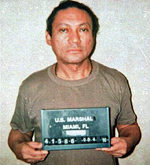 Namesake Manuel Noreiga
Namesake Manuel Noreiga
ex-Panaman dictator
also 'looked Spanish'3. I "looked like someone Spanish". To properly hear this sentence, you need to inflect "someone Spanish" as you might "a child molestor". This was not a compliment, but a reminder of your fundamental alienism and swarthy untrustworthiness. However, neither was it quite an insult. A cheerfully tolerant attitude quite clearly accepted that as I couldn't help being a dark foreign type, I couldn't be blamed for it.
Over the years, while attitudes have doubtless changed a little in society at large, what has really changed is that I now deal largely with adult, rather than child, society. Adults are more socially cautious, and perhaps less honest, and as generalisations based on race or nationality are in danger of drawing the accusation of racism, the open alienation I once experienced has gone the way of smacking women on the bottom and telling jokes about the Irish. However, it remains the case that an English 'Manuel' is as authentic as a Japanese Elvis: I'll never be British.
The Spanish, in this case, were mainly my family, and to understand their attitude to my nationality, you needed to understand mum and dad's attitude to Britain and Spain in general.
 Spain, as remembered by mum and dadSpain was a beautiful country of history and pride. The people of Spain put on fresh, properly laundered underwear every day, went to an actual church as opposed to a trendy converted warehouse full of nuns playing guitars, and cooked all their food from fresh, natural ingredients. Couples married for life, there was no homosexuality (in fact, it was illegal in Spain, but that was ok because there was just no demand for it anyway), and there was no chewing gum on the pavement.
Spain, as remembered by mum and dadSpain was a beautiful country of history and pride. The people of Spain put on fresh, properly laundered underwear every day, went to an actual church as opposed to a trendy converted warehouse full of nuns playing guitars, and cooked all their food from fresh, natural ingredients. Couples married for life, there was no homosexuality (in fact, it was illegal in Spain, but that was ok because there was just no demand for it anyway), and there was no chewing gum on the pavement.
Spanish women were the most beautiful in the world, and Spanish men fought bulls just to soak up their overflowing courage and nobility. The Spanish empire was the greatest the world had ever seen, but Spain didn't have one now because it had decided it didn't need a bunch of foreign hangers-on any more. There was no crime, because the Spanish were too decent and the foreigners too frightened of the Spanish police, and no strikes, because people believed in hard work.
It was a kind of Narnia with fascists.
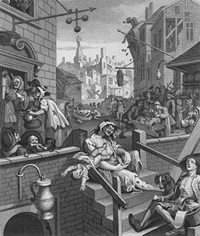 Britain, as seen by mum and dadBritain, on the other hand, was a network of brothels and opium dens connected by a moderately efficient motorway system. The people very seldom changed their underwear. They lived on microwavable snack-foods synthesised from plastic by-products of the nuclear industry, and farted in public. The minimum length of a British marriage was restricted only by the amount of time it took to complete a service. Homosexuality and promiscuity not only raged unchecked, but on carpets so filthy that anything might be living in them.
Britain, as seen by mum and dadBritain, on the other hand, was a network of brothels and opium dens connected by a moderately efficient motorway system. The people very seldom changed their underwear. They lived on microwavable snack-foods synthesised from plastic by-products of the nuclear industry, and farted in public. The minimum length of a British marriage was restricted only by the amount of time it took to complete a service. Homosexuality and promiscuity not only raged unchecked, but on carpets so filthy that anything might be living in them.
Over time, the gap between Spain and Britain grew wider and more bizarre, as detail upon detail was added in response to the events of everday life. The most memorable distinction was surely drawn on the evening when my father, infuriated at being unable to find somewhere to park, commented that there were no spaces 'in this bloody country'. In Spain, it seemed, there was somewhere to park.
Above all, in Britain the young people were dropouts, and trouble-makers who were too busy pushing safety pins through their noses to concentrate on studying assiduously and obeying the fourth commandment like their upstanding Spanish counterparts.
OK, I guess you can probably see by now where this is going. As my parents watched my politics and my personal life take turns that distinctly concerned them, they sadly shook their heads and said "he's British". My separation from them became, effectively, a separation from Spain. Not until many years later did I go and make it up with the old country during a few months lived in Madrid: but travelling on a British passport and speaking villainous Spanish, I was, and will always be, a foreigner there.
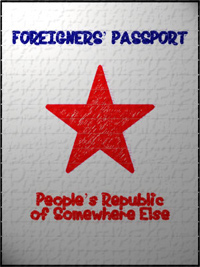 "Foreigners' Passport":
"Foreigners' Passport":
I was very hot on punctuation thenDon't imagine that I spent all of my time being persecuted by my school friends for being foreign: far from it. There was also my lefty politics, my being a mod, and my dancing to take the piss out of, so being foreign was a minor additional burden. Loud mutual insults were, in any event, the language of friendship: overtly displayed affection would have been appallingly embarrassing for us as schoolboys. I gave worse than I got, in the main.
No, what made the situation miserable was the periodic holidays with my cousins. Judging from those who visited us, those who we visited, and even those pointed out to us while walking through the streets of Spain, I have perhaps two or three thousand Spanish cousins. I grew up with the firm conviction that if you took any two Spaniards at random, chances were they'd be cousins.
The cousins themselves were delightful: terrifyingly warm, friendly, and full of life. However, in their presence I felt as foreign as Yasser Arafat at a Bah Mitzvah, and through a terror of speaking poorly I refused to use even what Spanish I knew: which effectively meant I was silent, as they knew no English. It was during these holidays, and in the months leading up to them, and the months after, that I felt cheated at being a foreigner everywhere.
In the back of a schoolbook I doodled an expression of this frustration: a "Foreigner's Passport", issued by the Government of "The People's Republic of Somewhere Else", and adorned by a big, red, socialisty star. It was the work of an extremely slow Latin class: carefully drawn in heavy red and blue biro, and then forgotten about until it was returned marked "?" next time I used the book to hand in homework. It is long since lost, of course, but it looked something like the picture on this page.
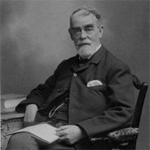 Samuel Butler. Bastard.I began to give my nationality as "foreign" whenever I was asked, and the "People's Republic of Somewhere Else" - always a bit of a mouthful - became first "Nowhere", and then "Erewhon".
Samuel Butler. Bastard.I began to give my nationality as "foreign" whenever I was asked, and the "People's Republic of Somewhere Else" - always a bit of a mouthful - became first "Nowhere", and then "Erewhon".
I was actually quite pleased with "Erewhon", right up until the moment I discovered that Samuel Butler had written a satire set in a fictional land by that name in 1871, beating me to the punch by about 107 years. Bastard.
 Manny Ramirez: Baseball Player
Manny Ramirez: Baseball Player
Manny Bianco (TV's Black Books): Accountant
Manny Manfredd, (Film Ice Age) Prehistoric woolly mammoth
Famous Mannys: the pattern is obviousIn adult life, my crystalising internationalist views (see Imagine...) catalysed my childhood dream of a anti-national nation, and I turned again to that project because I wanted to create a satire on the state, and because I wished to claim my right to freedom. And because it was, in my ridiculously nerdy way, quite fun.
Interestingly, as an adult I was now enduring a different kind of confusion about my origins.
The young sons of a norteamericano friend of mine decided that 'Manuel' was tiresome, and announced "we'll call you 'Manny Baby!'". The 'Baby!' I discourage (except in distinctly informal situations), but Manny has stuck.
 A crab overcoming obstacles. As usual.However, while common in the US, Manny is less familiar here. In fact, in Britain, it is only common in Jewish families, contracted from Emmanuel. I didn't know this, so when a friend inviting me to dinner asked "are you orthodox?" I could only worry slightly at the intellectual conformity he seemed to demand from prospective guests. I nervously replied "Not particularly...". The three minutes that followed probably constitute the most baroque conversation ever held in the English language. In the end, though, we did establish that (1) he was Jewish but 'non-practising', (2) he'd always assumed I was Jewish, (3) I wasn't, and (4) we both liked crab. A happy outcome for all, except possibly the crab. Life is tough for crustaceans.
A crab overcoming obstacles. As usual.However, while common in the US, Manny is less familiar here. In fact, in Britain, it is only common in Jewish families, contracted from Emmanuel. I didn't know this, so when a friend inviting me to dinner asked "are you orthodox?" I could only worry slightly at the intellectual conformity he seemed to demand from prospective guests. I nervously replied "Not particularly...". The three minutes that followed probably constitute the most baroque conversation ever held in the English language. In the end, though, we did establish that (1) he was Jewish but 'non-practising', (2) he'd always assumed I was Jewish, (3) I wasn't, and (4) we both liked crab. A happy outcome for all, except possibly the crab. Life is tough for crustaceans.
Anway, this confusion arose so often that when telling people my name I began taking the precaution of explaining that I 'wasn't Jewish'. Sadly, this simple act of clarification seemed replaced the misconception that one was Jewish only with the unshakeable conviction that one was a National Socialist, and I have been forced to abandon it.
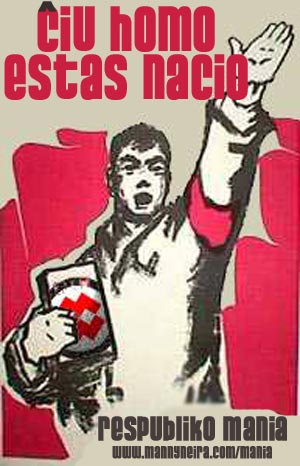 "EVERY HUMAN IS A NATION!"But from 'Manny's nation', it is a short jump to Mania, and I immediately realised that the one-man-republic had found a name at last: a name which went on to be enshrined as the first article of a new Constitution. At this point, this brief history closes: turn to the constitution, and the pages following, to pick up the story of the modern Republic of Mania...
"EVERY HUMAN IS A NATION!"But from 'Manny's nation', it is a short jump to Mania, and I immediately realised that the one-man-republic had found a name at last: a name which went on to be enshrined as the first article of a new Constitution. At this point, this brief history closes: turn to the constitution, and the pages following, to pick up the story of the modern Republic of Mania...
...and should you reject tyranny, and find your nation, Mania salutes you.